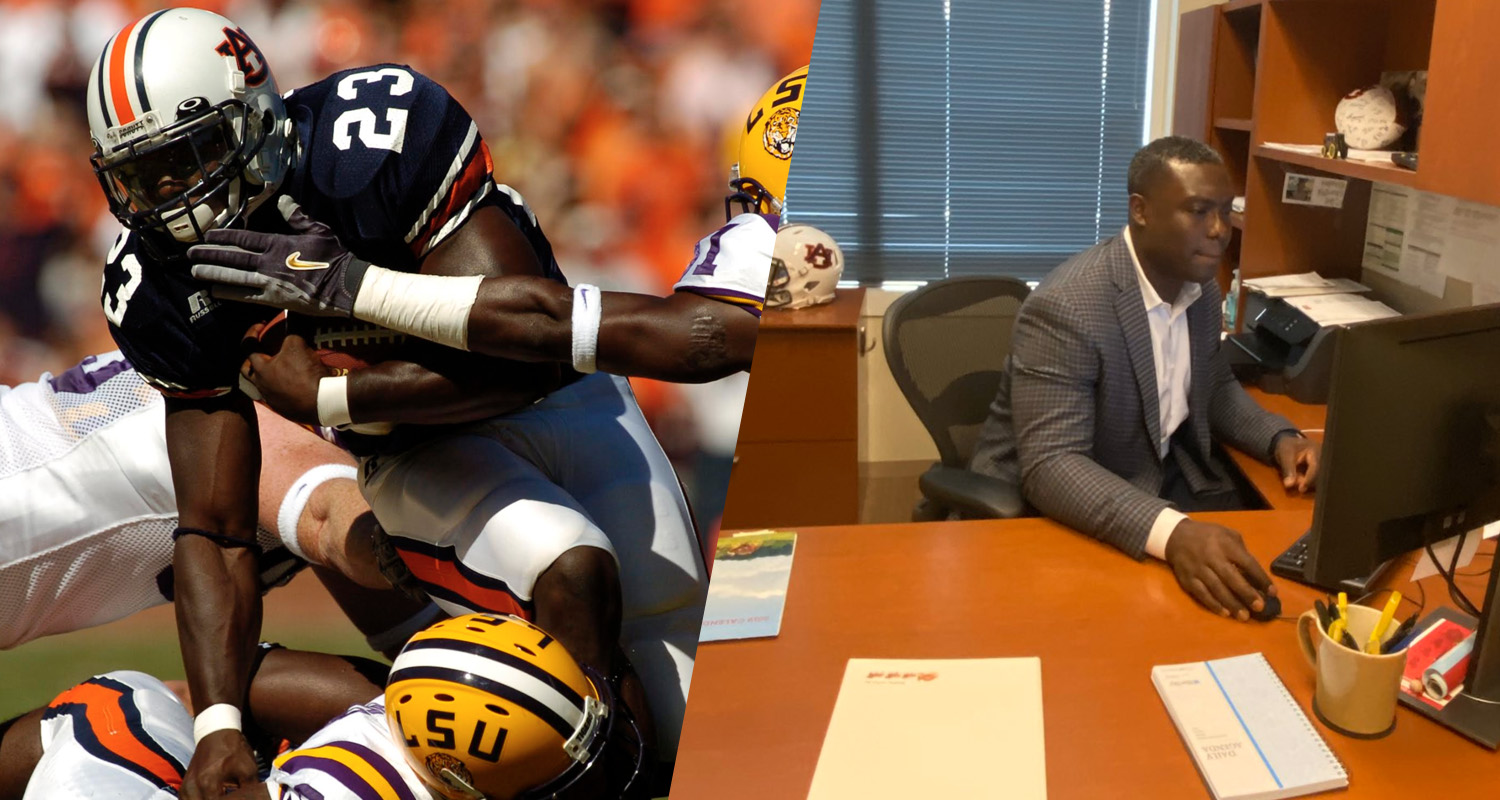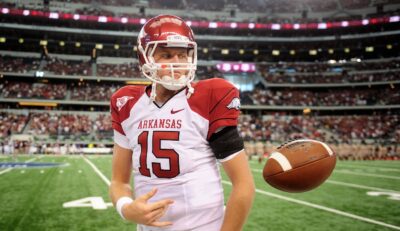
From Auburn to the NFL to financial advisor: The Ronnie Brown Story
By Al Blanton
Published:
After a long and successful NFL career, Ronnie Brown could have stayed in the game as an analyst. He quickly realized he could make a bigger impact in a new field.
In the green room of the Javits Center at 655 West 34th Street in Manhattan, Todd France leaned over to his client.
“It’s the Dolphins,” France murmured. “They want to talk to you.”
Seated next to France was Auburn’s backup running back, Ronnie Brown, perhaps the unlikeliest No. 2 pick for the 2005 NFL Draft. Just a few weeks prior, Brown had hoped to be selected in one of the earlier rounds, his draft grade projecting him a third-rounder, possibly late second. He never considered he’d be invited to New York, much less be the second individual off the board.
Brown had had a stellar career at Auburn, accumulating over 2,700 yards rushing and scoring 28 touchdowns, but largely served on the second string behind starting tailback Carnell “Cadillac” Williams. So when France handed him the phone after quarterback Alex Smith was taken as the No. 1 overall pick, Brown thought it was a spoof. “I’m telling (Todd), this isn’t a time to be joking,” Brown reflects. “I’m looking over at Braylon Edwards’ table. I’m assuming he is going to go to Miami as the second pick and I’m going to be somewhere later in the draft, probably in a city where it’s cold. Absolutely I was surprised.”
But it was no joke. On the other end of the line was new Miami Dolphins head coach Nick Saban, who was making his first draft selection as an NFL head coach.
Though most of the moment was a blur, Brown does remember certain pieces of the exchange with Saban. “I think the conversation was, ‘how would you like to be a Miami Dolphin?’” Brown remembers. “For me, I would love to. After that, I walked across the stage, shook Mr. Tagliabue’s hand, held up the jersey, and was off to Miami.”
Success was arriving at breakneck speed for the kid from the small town of Cartersville, Georgia. In just a short time, Brown would sign a 5-year, $35 million contract — $19 million of which was guaranteed. He would be competing against magnificent, well-honed athletes — gladiators performing at the highest level — on the biggest stage, in front of the world. And though many would view this as a cause for celebration, in reality Brown’s new normal introduced a new set of problems. He would soon be exposed to the multihued decadence of the Miami club scene and the general temptations of NFL life. He would be faced with the anxiety of newfound expenditures and a social life that encouraged excess. He would have to fill idle time once eaten up by classes and homework with productive and edifying activities. And he would soon have a radius of people tugging at him for various forms of help. All of which rolled up into a dynamic ball of fire for which a 23-year-old was ill-prepared.
As challenges arrived on multiple fronts, Brown navigated the transition to professional life as best he could. On the field, Miami had a core of league veterans like Jason Taylor and Zach Thomas who were somewhat desensitized to the frills of the twentysomething life and showed Brown what professionalism is and looks like. But while these influences were easy to observe, they were much harder to emulate. Older players had already been through their rites of passage, and it was often hard for younger players to adopt that same lifestyle, Brown admits.
Off the field, Brown felt isolated, and though there were individuals available to help him tread this new territory financially, socially, and even morally, by and large he avoided seeking help. “Looking back in hindsight, I wish I would have had a lot more of those conversations because that would have helped me make educated decisions as I went through it,” he said.
This was due, at least in part, by a general sense of mistrust that exists in professional circles. Even though resources do exist to help usher young professional athletes through this transition period, it’s often hard to know whom to trust. “There are so many people willing to help individuals, but you realize a lot of it isn’t genuine … and there are so many people doing it for the wrong reasons,” Brown said. “You don’t want to reach out for fear of reaching out to the wrong person or being taken advantage of.” Therefore many, like Brown, choose to keep things close to the vest, cautiously allowing only fractions of their lives to be exposed to outsiders.
Fortunately, discipline and accountability were side effects of Brown’s interaction with his new head coach. Under Saban’s tutelage, Brown developed into a solid back and learned principles he would carry throughout his NFL career and beyond. Saban often extended lessons to his pupils through the medium of storytelling, and Brown remembers one particular parable about a young man who was a street sweeper. Though this man worked a thankless job that involved rigorous manual labor, he had such pride in his work that he put a sign up in his yard that read, ‘The World’s Best Street Sweeper Lives Here.’”
“That resonated with me,” Brown said. “Anything you decide to do, take the mentality of being the best at it.”
Saban’s inspiration and instruction translated into success on the field. In his rookie season, Brown rushed for 907 yards and finished second in total rushing yards among all first-year backs. The next year he topped the 1,000-yard mark, scoring 5 rushing touchdowns and hauling in 33 receptions for 276 yards.
A series of injuries would stifle Brown’s pro career, but he still managed to rush for 5,391 yards and 38 touchdowns across 10 seasons. In 2008, a year in which he rushed for 916 yards and a career-best 10 touchdowns, Brown was selected to the Pro Bowl.
Brown spent most of his career in Miami, but also had stints in Philadelphia, San Diego, and Houston. He says upon finishing the 2014 season with the Chargers, his body made it achingly clear that it was time to retire. “I think my body knew, the league knew, as well as myself,” he said.
Now that his playing days were over, his mind had to adjust to a life devoid of musty locker rooms and twisting bodies on turf. He’d been so far on his journey; he’d found money, success, and fame — and he was only 33 years old. Now it was time to begin a new chapter. “I was trying to figure out what was next,” Brown said. “How could I have a purpose and try to fulfill that purpose.”
Sports media seemed to be a natural path. He’d graduated from Auburn in 2004 with a communications degree. He was qualified, a fastidious dresser, and had the requisite football acumen to comment intelligently on camera — why not become a commentator?
Eventually Brown landed an interview with the SEC Network, but as he was driving to the interview he was unsettled. “Something told me that’s not where my heart is, where my passion and purpose was,” Brown remembered.
Though he had doubts, he pressed on and went to the interview. Being away from the college game for so long, he wasn’t as up-to-date on Southeastern Conference football as he once was, and this was a reality that emerged in the interview process and affirmed his decision to look elsewhere. “I think I could have been pretty good at it, but something inside of me was tugging, ‘this is not what you are supposed to be doing,’” he said.
Brown eventually realized that at least part of his purpose would be found in helping young athletes navigate the same challenges of professional and personal life that he experienced as an NFL player. As he viewed the league from a different perspective, he began to see so many similarities of guys coming into the league who reminded him of a young Ronnie Brown. They were trying to choose an agent, find authentic helpers while sorting through the wolves, and negotiate the challenges of being a professional athlete. Brown thought the best way to be of service to these individuals was to be on the financial side of the aisle.
Because he didn’t go to school for finance, there were a few educational hurdles that he’d have to clear before becoming a financial advisor. By this time, he’d settled down with a family and had children, and the work-life balance would be temporarily disrupted while he studied for securities registrations.
After passing all of his prerequisites, Brown landed a job in the Atlanta area as a wealth strategy associate. Now he co-leads a wealth management practice that takes a holistic approach to financial advising and strategy.
Brown works on the third floor of an office building in Buckhead, not far from the shopping cynosure on Peachtree. His office is peppered with sports memorabilia that includes two of his prized helmets — Auburn and Miami Dolphins — as well as quotes, sayings, and motivations. Framed is a photo of Brown being chosen as Auburn’s 2018 SEC Legend, and soon to be added will be a medal from the Alabama Sports Hall of Fame as a newly inducted member.
While Brown is humbled by these accolades, he is quick to credit others who played a part in his success. Now he wants to give back by mentoring young athletes.
There’s a psychological piece to Brown’s advising repertoire that’s particularly intriguing. Crucial to his philosophy is the question, “What’s your why?” In other words, Brown likes to discover what motivates an individual, because until you change the mindset, he says, you can’t change the habits. Using his own experience as a guide, Brown knows what it’s like to grow up in want and the subsequent challenges that nascent fortune presents.
“Because I grew up not having a lot — having to share clothes, sleep in bed with my relatives, share a room with my brother — when you get to the stage where you can afford such things, you tend to splurge,” Brown says. “Much of it is being disciplined and getting out of the mindset of how you grew up.”
The scope of Brown’s work is not limited to just athletes, however. He also works with business owners, entertainers, entrepreneurs and any other professional who needs assistance with wealth management. “It’s not just athletes, it’s everyone,” he says. “My relationship with clients is really about working as a team and I approach it that way.”
In many ways, Ronnie Brown is helping others to establish a life of discipline, make good choices, and have pride in your work—something his coaches instilled in him. He knows that life can come at you quickly, and if you’re not prepared, it can eat you alive. “That self-discipline,” Brown says, “that’s pretty much everything in life.”
Al Blanton is the owner of Blanton Media Group, publishers of 78 Magazine and Hall & Arena.







